Photo Sharing - Upload Video - Video Sharing - Share Photos
Monday, October 30, 2006
The Center of Paul’s Theology and the Order of Salvation

“The central soteriological reality is union with the exalted Christ by Spirit-created faith. That is the nub, the essence, of the way or order of salvation for Paul. The center of Paul’s soteriology, at the center of his theology as whole, then, is neither justification by faith nor sanctification, neither the imputation of Christ’s righteousness nor the renewing work of the Spirit. To draw that conclusion, however, is not to “de-center” justification (or sanctification), as if justification is somehow less important for Paul than the Reformation claims. Justification is supremely important, it is absolutely crucial in Paul’s gospel of salvation” (cf.Eph.1:13). Deny of distort his teaching on justification and that gospel ceases to be gospel; there is no longer saving “good news” for guilty sinners. But no matter how close justification is to the heart of Paul’s gospel, in our salvation, as he sees it, there is an antecedent consideration, a reality, that is deeper, more fundamental, more decisive, more crucial: Christ and our union with him, the crucified and resurrected, the exalted, Christ.
[1] pg. 43 From Richard Gaffin’s “By Faith, Not by Sight: Paul and the Order of Salvation”
Friday, October 27, 2006
This is just sad
Monday, October 16, 2006
Understanding God’s Wrath

In Leon Morris’s book The Apostolic Preaching of the Cross, he gives us some insights on how to think about God’s wrath.
Friday, October 13, 2006
Saturday, October 07, 2006
WJDFW – You Must Be Born Again
“Jesus answered…”Do not marvel that I said to you, “You must be born again”- John 3:5 and 7
[1] pg 37-39
Thursday, October 05, 2006
What Jesus Demands From the World Part 1
I just got my copy of John Piper’s new book, “What Jesus Demands from the World.” In my excitement, I just finished the introductory chapter of the book, where Piper describes his aim for the book in typical Piper-ish fashion:
I can’t wait to dive more into this book and to have my soul satisfied with the presence of God.
Tuesday, October 03, 2006
The Drama of Scripture

“The Drama of Scripture: Finding Our Place in the Biblical Story” by Craig Bartholomew and Michael Goheen is probably the best book I have read all year. In Bartholomew and Goheen’s book, it sets out to help Christians find their purpose within the larger biblical story by organizing the story into a six-act structure:
Act 1: God Establishes His Kingdom: Creation
Act 2: Rebellion in the Kingdom: Fall
Act 3: The King Chooses
Scene 1 A People for the King
Scene 2 A Land for His People
Interlude: A Kingdom Story Waiting for Ending: The Intertestamental Period
Act 4: The Coming of the King: Redemption Accomplished
Act 5: Spreading the News of the King: The
Scene 1 From
Scene 2 And into All the World
Act 6: The Return of the King: Redemption Completed [1]
Not only is this book helpful through it’s six-act structure, in my opinion, it also seems to be making the right emphasis within the larger biblical story. The authors states their 3 emphases as:
1. Comprehensive scope of God’s redemptive work in creation.
“First, we stress the comprehensive scope of God’s redemptive work in creation. The biblical story does not move toward the destruction of the world and our own “rescue” to heaven. Instead, it culminates in the restoration of the entire creation to its original goodness.” [2]
2. The believer’s own place within the biblical story.
“Second, we emphasize the believer’s own place within the biblical story. Some refer to four questions as foundational to a biblical worldview: “Who am I?” “Where am I?” “What’s wrong?” “What’s the solution?” Tom Wright adds an important fifth question: “What time is it?”…As part of our telling of the Bible’s grand story, we will explore the biblical answers to these five questions. [2]
3. Centrality of
“Third, we highlight the centrality of mission within the biblical story. The Bible narrates God’s mission to restore the creation.
[1] pg. 27
[2] pg.12-13


